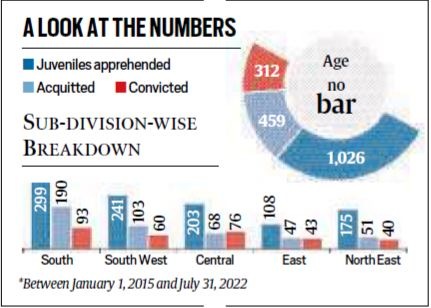 A few of the juveniles were arrested in the cases of sexual assault involving charges of POCSO Act, attempt to murder and murder too.
A few of the juveniles were arrested in the cases of sexual assault involving charges of POCSO Act, attempt to murder and murder too.From January 1, 2015, to July 2022, a total 1,026 juveniles were apprehended and 44 per cent (459) of them were acquitted, 30 per cent (312) were convicted and criminal investigation against 24 per cent juveniles (255) is in progress, reveals informantion procured by The Indian Express from the Chandigarh Police under the Right to Information Act.
A majority of cases under which the juveniles were apprehended related to thefts, snatchings, vehicle thefts and assault cases. A few of the juveniles were arrested in the cases of sexual assault involving charges of Protection of Children against Sexual Offences (POCSO) Act, attempt to murder and murder too.
As many as 299 juveniles out of 1,026 were arrested in the area of South sub- division covering three police stations, including Sector 31, Sector 34 and Sector 49 police station, followed by 241 juveniles apprehended in South West police sub- division consisting of Sector 36, Sector 39 and Maloya police station.
The RTI reply states the highest number of juveniles, 190, out of a total acquitted 459 were apprehended by the South sub-division.
The juveniles apprehended in connection with any crime are kept in the Observation-cum-Special Home, also known as Juvenile Home in Sector 25, Chandigarh.
The apprehended juveniles are being tried by the Juvenile Justice Board (JJB), which functions under the provisions of Juvenile Justice Act. As per the JJA, criminal proceedings against an apprehended juvenile must be complete within four months but exemptions are available in many circumstances, including the apprehension of other suspects, long list of witnesses, the runnig away of the suspect.

Dr Madanjit Kaur Sahota, member, Juvenile Justice Board, Chandigarh, says, “The conviction and acquittal depends on the police investigation and charges against the apprehended individuals. More than this, the sole aim and purpose of the Juvenile Justice Act, under which apprehended juveniles are tried, is the rehabilitation and re-introduction of a juvenile into the mainstream. Before reaching a conclusion, the JJB considers the social background, family background, behaviour and the feedback generated from the repeated counselling of each apprehended juvenile. We consider each and every case keeping in mind the rehabilitation of the juvenile.”
A senior officer requesting anonymity says, “A juvenile was apprehended in multiple theft cases of two-wheelers. The juvenile underwent repeated counselling. The conclusion emerged that the juvenile belonged to a very poor family, which cannot afford a two-wheeler for him, who loved to ride two-wheelers. He learnt how to break the two-wheelers’ locks. He started taking joyrides on these vehicles and would dump these whenever fuel finished. He did not sell a single vehicle, which were all found parked in different places. We acquit the juvenile in all the cases.”
The RTI reply suggests the highest number of juveniles out of convicted 312 were convicted for theft, snatching, sexual assault etc. The maximum punishment for a juvenile under JJA is three years.